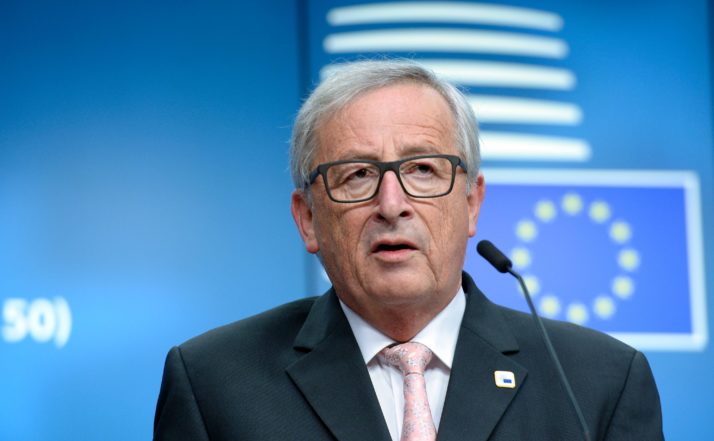The European Union should flex its potential strength as a world power as the U. S. under President Donald Trump pulls back from international engagement, EU chief executive Jean-Claude Juncker said on Wednesday.
In his annual State of the Union address to the European Parliament in Strasbourg, the European Commission president said that when united, the EU was a force to be reckoned with.
“Whenever Europe speaks as one, we can impose our position on others,” Juncker said.
With the EU still wounded by Britain’s imminent withdrawal, rising nationalism elsewhere and feuding over immigration and democratic values with right-wing eastern leaders like Hungary’s Viktor Orban, Juncker insisted the bloc was more united than it might seem and could use that to shape the world to its tastes.
As he begins a final year in office that will see Europeans elect a new EU legislature in May, the veteran former premier of Luxembourg noted his successful bid to talk Trump out of an immediate tariff war in July and highlighted new interest from China in working with Brussels to keep world trade flowing free.
Pointing to questions in many countries over Washington’s role as the global economic leader, Juncker also said the euro should be better promoted as a world currency, querying why EU energy imports, for example, are mostly priced in dollars when almost none of them come from the U. S.
The Commission wants to complete an EU trade pact with Japan by May, one of several deals that is consolidating the EU at the heart of a web of global agreements on standards as Trump has turned Washington against multilateral obligations.
He also announced the launch of a new trade relationship with Africa.
“Africa does not need charity, but a true and balanced partnership,” he said, proposing a new alliance that would create 10 million jobs in Africa over five years and help African students and researches go on exchange programs in Europe.
Juncker also proposed beefing up Europe’s defenses against poor Africans heading north by creating a fully Brussels-run European Border and Coast Guard with a full-time strength of 10,000 to help keep back economic migrants whose arrival has fueled anti-EU nationalism.
Worries over how far hostile parties within and outside the European Union might try to manipulate the EU elections also lie behind a proposal to impose fines on politicians caught cheating on data protection rules and to beef up oversight of campaigning.
Juncker’s legislative proposals will face scrutiny in Parliament and from member states, with some of the latter wary of a plan to scrap their veto over some areas of foreign policy in an effort to give the EU a nimbler actor in global diplomacy.(Reuters/NAN)

